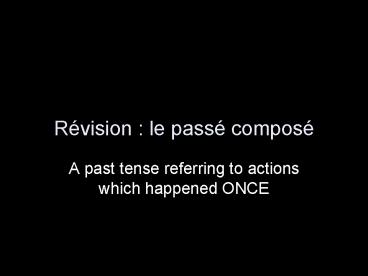Rvision : le pass compos - PowerPoint PPT Presentation
1 / 15
Title:
Rvision : le pass compos
Description:
R vision : le pass compos . A past tense referring to actions which happened ONCE. Each action is expressed through THREE words. The name of the person who did ... – PowerPoint PPT presentation
Number of Views:48
Avg rating:3.0/5.0
Title: Rvision : le pass compos
1
Révision le passé composé
- A past tense referring to actions which happened
ONCE
2
Each action is expressed through THREE words
- The name of the person who did the action
- The auxiliary verb
- AVOIR or ETRE
- The past participle which ends in
- é regardé / allé / travaillé
- I fini / choisi / rempli
- u attendu / bu / lu
- s or t mis / pris / fait / dit
3
AVOIR VERBS
- The past participle doesnt change
- Jai mangé Nous avons mangé
- Tu as mangé Vous avez mangé
- Il a mangé Ils ont mangé
- Elle a mangé Elles ont mangé
- On a mangé
4
Meaning in English
- Remember that we have more versions of this tense
in English and so each past tense can be
translated 3 ways - Jai vu I have seen
- I did see
- I saw
5
ETRE VERBS
- The past participle agrees with ( matches ) the
person who did the action, by adding e for
feminine subjects and s for plural subjects - Je suis descendu(e) Nous sommes descendu(e)s
- Tu es descendu(e) Vous êtes descendu(e)s
- Il est descendu Ils sont descendus
- Elle est descendue Elles sont descendues
- On est descendu
- Je suis descendu(e) I have been downstairs
- I did go downstairs
- I went downstairs
6
13 verbs belong to this group
- Naître Descendre
- Partir Tomber
- Retourner Mourir
- Arriver Monter
- Entrer Aller
- Rester Venir
- Sortir
7
REFLEXIVE VERBS ALSO USE ETRE
- Je me suis levé(e) Nous nous sommes levé(e)s
- Tu tes levé(e) Vous vous êtes levé(e)s
- Il sest levé Ils se sont levés
- Elle sest levée Elles se sont levées
- On sest levé
- Je me suis levé(e) I have got up
- I did get up
- I got up
8
Give the correct form of the verb in the past
tense
- Exemple Je _____ ________ (MANGER)
- Jai mangé
- Nous _____ ________ (ECOUTER)
- Il _____ ________ (FINIR)
- Vous _____ ________ (PRENDRE)
- Elle _____ ________ (ARRIVER)
- Je (f) _____ ________ (ENTRER)
- Ils ___ _____ ________ (SAMUSER)
- Tu _____ ________ (FAIRE)
- Elles _____ ________ (RESTER)
- Il _____ ________ (BOIRE)
- Je (m) ___ _____ ________ (SE RÉVEILLER)
9
Les réponses
- Nous avons écouté
- Il a fini
- Vous avez pris
- Elle est arrivée
- Je suis entrée
- Ils se sont amusés
- Tu as fait
- Elles sont restées
- Il a bu
- Je me suis réveillé
10
Complète les phrases
- See what you can think of as a suitable ending
for a sentence starting with the verbs you have
just formed.
11
Interesting facts
- The past participle of a reflexive verb agrees
with the reflexive pronoun which is usually the
DIRECT OBJECT of the verb (this means it has the
action done to it) - Elle sest levée she washed herself
- herself is the direct object, so the past
participle agrees with it (feminine singular)
12
More interesting facts
- Sometimes there is another named direct object
with a reflexive verb. - When this happens, the past participle DOESNT
agree - Elle sest lavé les mains
- Ils se sont envoyé des e-mails
13
Even weirder facts
- The past participle of avoir verbs sometimes
AGREES!!!! - But only with the direct object of the verb, if
it comes before the verb - La maison quil a achetée est grande
- Les bonbons que nous avons mangés étaient
délicieux
14
And you wont believe this
- Sometimes être verbs use avoir instead
- when they have a DIRECT OBJECT !
- Jai sorti le chien samedi.
- I took the dog out on Saturday.
- Il a monté lescalier.
- He went up the stairs.
15
Some brain teasers
- Decide if the following past participles
should or shouldnt agree and why - Ils se sont levé de bonne heure.
- Elle sest cassé la jambe.
- Ils se sont offert un cadeau.
- Je me suis brossé les cheveux.
- Elle sest amusé au parc.
- Nous nous sommes dit Bonjour.































